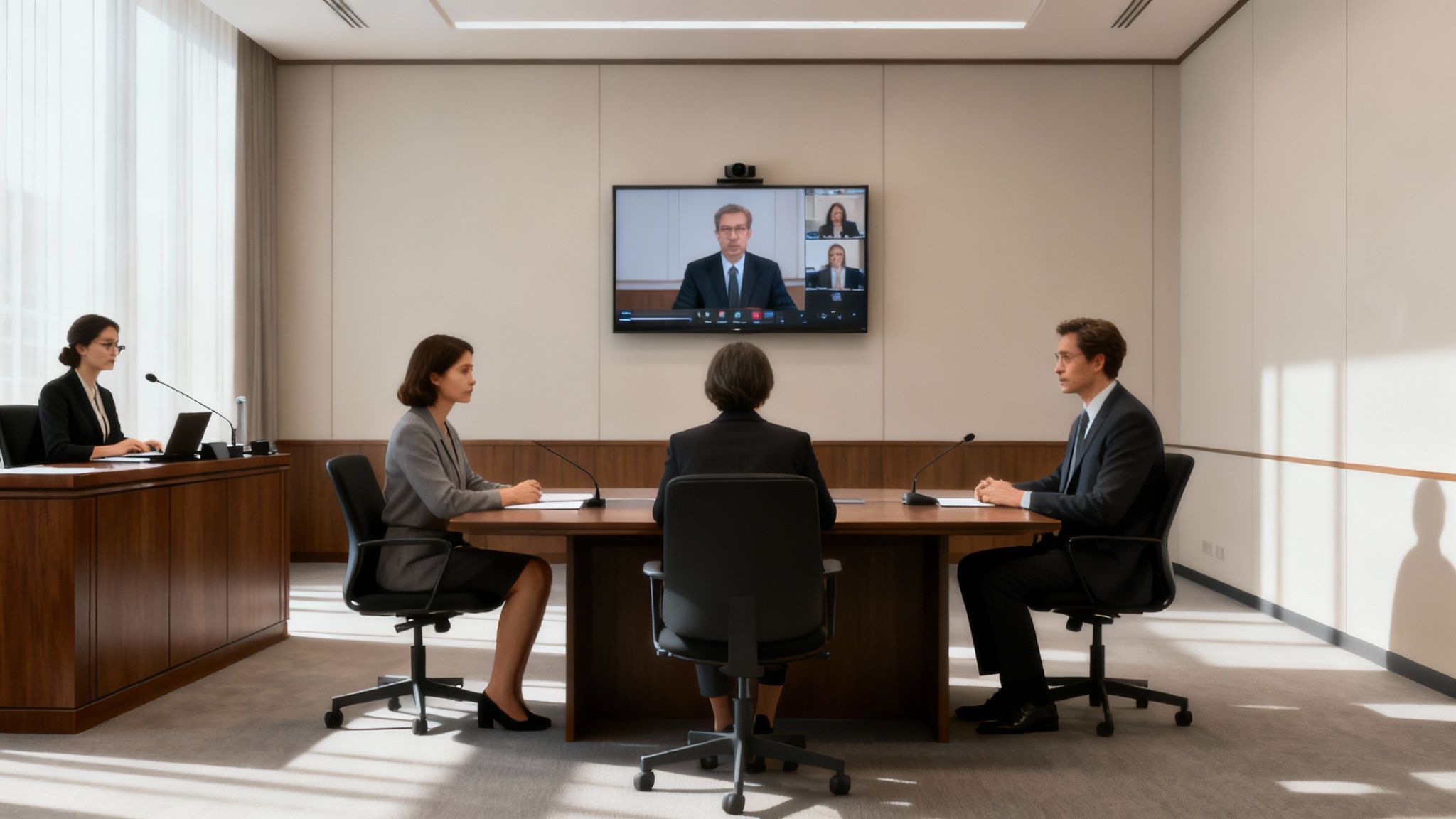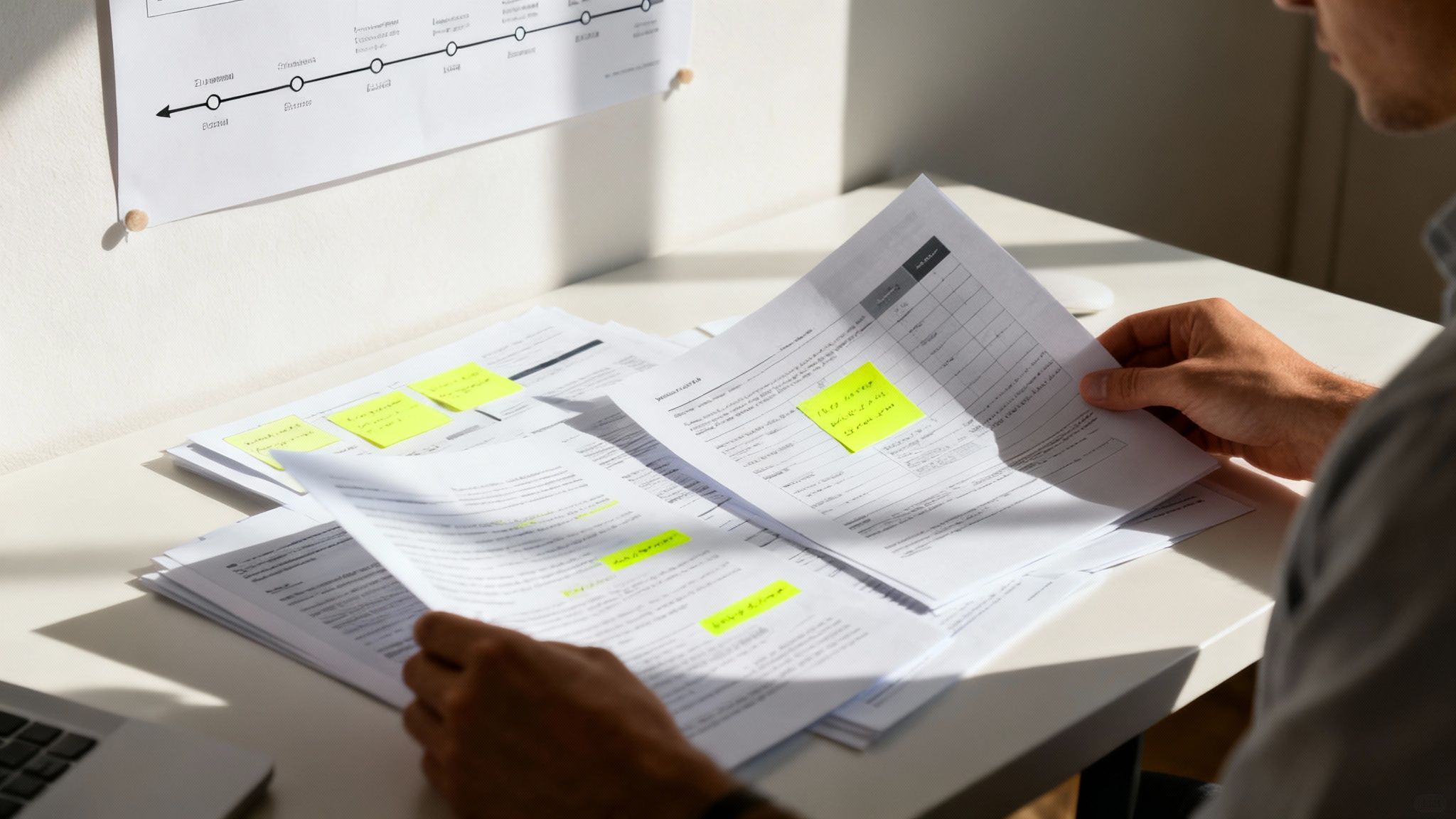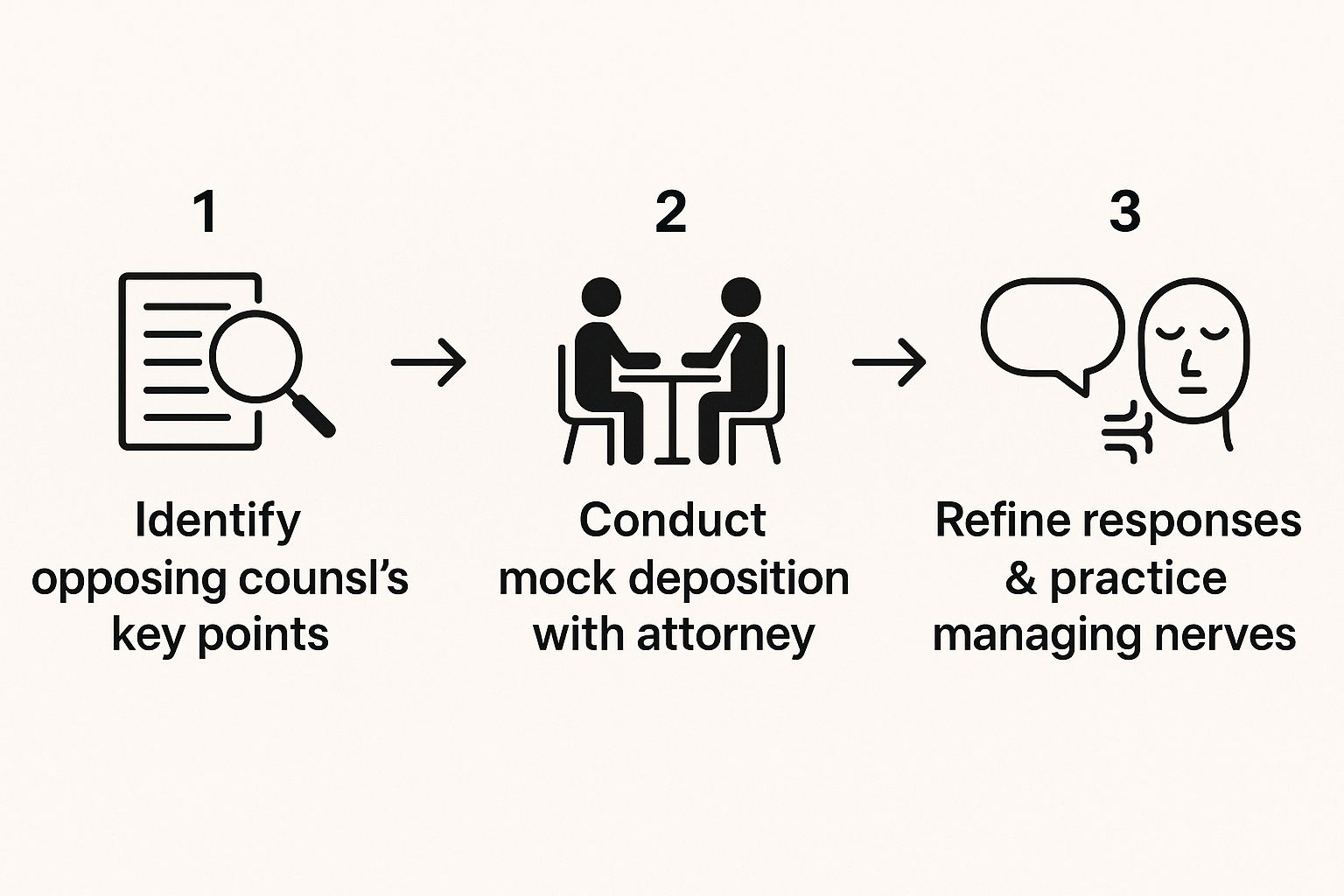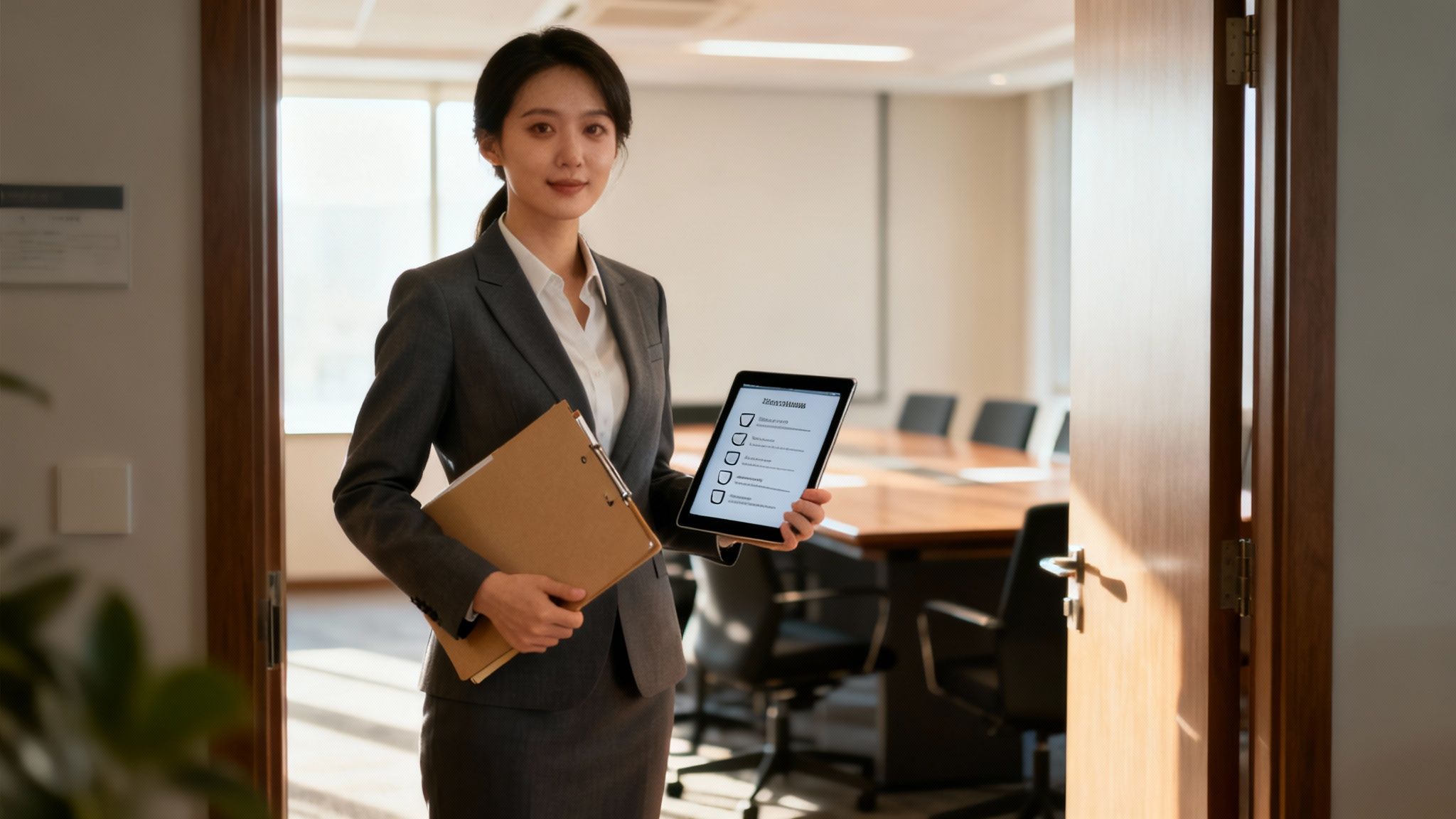Prepare for Deposition: Tips to Build Confidence
"I was satisfied once John Bell took over my case."
"Communication was always timely."
Prepare for Deposition: Tips to Build Confidence
Before you can properly prepare for a deposition, you need to understand what it actually is and why it's such a critical part of your case. It's not just a casual chat; it's a formal, out-of-court interview where you give sworn testimony.
Think of it as the opposing side's chance to conduct a fact-finding mission. Every word you say carries the same weight as it would in a courtroom, and getting this first concept right is the bedrock of solid preparation.
What a Deposition Is and Why It Matters
Let's pull back the curtain on the deposition process. At its heart, a deposition is simply a question-and-answer session where you're placed under oath and questioned by the other party's attorney. The goal is straightforward: they want to gather facts, hear your side of the story, and pin down your testimony long before a potential trial.

While the setting—usually a conference room or a video call—might feel more relaxed than a courtroom, the stakes are just as high. A court reporter will be there transcribing everything you say, creating an official record that can be used to question your credibility later if your story changes even slightly.
Key Players in the Room
Knowing who to expect can take a lot of the anxiety out of the equation. Typically, the room (or video call) will include:
- Your Attorney: They're your advocate, present to protect you and object to any improper questions.
- Opposing Counsel: This is the lawyer for the other side, and they will be the one asking most of the questions.
- The Court Reporter: A neutral professional whose only job is to create a verbatim transcript of the proceedings.
- The Deponent: That's you—the person giving testimony.
Once you understand the who, what, and why, the entire event transforms from a scary unknown into a process you can navigate.
Your testimony serves two main functions for the opposing side: it helps them discover new information, and it preserves your story, making it difficult for you to change your account later.
This part of the legal world is also evolving quickly. The legal technology industry is projected to hit $25 billion globally by 2025, and deposition services are a huge part of that growth. This boom is driven by more litigation and the explosion of remote deposition tools, which have made the process more accessible than ever. You can read more about the top deposition trends on JD Supra.
Ultimately, if you can see the deposition as a structured information-sharing session rather than an interrogation, you're already on the right track. It's your opportunity to tell your story clearly and consistently, all with your lawyer right by your side.
Mastering the Facts of Your Case
When it comes to preparing for a deposition, nothing beats a rock-solid command of the facts. This is your foundation. It’s time to roll up your sleeves with your attorney and dig into every single relevant document—we’re talking emails, contracts, text messages, medical reports, you name it. The point isn’t just to memorize a few key dates; it’s about truly understanding the story of your case, inside and out.

When you’re deeply familiar with the details, you build the kind of confidence that helps you answer questions accurately and consistently, even when the pressure is on. A testimony grounded in a verifiable narrative is your best defense against getting tripped up by unexpected questions.
Building Your Case Timeline
First things first, get everything organized chronologically. This simple step can transform a messy pile of papers into a coherent story that flows from beginning to end. It’s amazing how much clarity a timeline provides.
For example, in a personal injury claim, your timeline would logically start on the day of the accident. From there, you'd map out every doctor’s appointment, physical therapy session, and conversation with the insurance company. This structure makes it much easier to recall events in the right order. For anyone in this situation, a key part of building this timeline is knowing how to get medical records.
Of course, recalling details under pressure is a skill in itself. It's worth looking into practical strategies that can help you improve memory retention before the big day.
Identifying Key Documents and Events
Let's be honest, not every piece of paper is a game-changer. You and your attorney need to work together to pinpoint the documents that really matter—the ones the other side will almost certainly focus on.
Look for items like these:
- The "Smoking Gun": This is any document that directly proves your point or demolishes the other side’s argument. Think of a signed contract, a critical email, or a damning photograph.
- Contradictory Evidence: Don’t ignore documents that seem to go against your story. The other lawyer will find them, so you need to be ready to explain the context.
- Communications: Pay very close attention to the tone and specific wording in emails and text messages. They’re often a goldmine for revealing someone's true intent.
The goal of this review isn't to script perfect answers. It's to understand the complete story the evidence tells—the good, the bad, and the ugly. Your attorney is there to help you frame that narrative and prep for the tough questions.
This detailed review process is also your best tool for anticipating the other side's strategy. If you sent an email that could be interpreted in a couple of ways, you can bet you'll be asked about it. Walking through your explanation with your lawyer ahead of time is absolutely essential.
Connecting the Dots
Once you have your timeline set and your key documents identified, the final piece is to weave it all together into a seamless narrative. Stop thinking of each document as an isolated piece of information and start seeing how it fits into the bigger picture.
For instance, how does that maintenance report from three weeks before your workplace accident connect to the injury you sustained? Making these connections doesn't just solidify your own understanding; it makes your testimony far more credible and compelling.
By taking the time to truly master the facts, you transform yourself from a nervous participant into an empowered witness who can tell their story with confidence and truth. This is the bedrock of a successful deposition.
Working with Your Attorney to Build a Strategy
When you're gearing up for a deposition, your attorney is your single most important resource. Think of them less as a legal advisor and more as your strategic partner. This collaboration is what transforms you from someone simply answering questions into a confident, well-prepared participant who understands the game being played.
This partnership really takes shape during your prep sessions. You'll sit down together and try to get inside the head of the opposing counsel, anticipating their strategy and the questions they're likely to throw at you. This is your chance to ask anything you're unsure about and get a feel for their objectives. Your lawyer's experience is critical here; they can spot potential traps from a mile away and pinpoint the parts of your case that need the most careful handling. If you haven't yet found the right legal partner, understanding how to choose a personal injury attorney is an essential first step.
The Crucial Role of Mock Depositions
One of the best preparation tools your attorney has is the mock deposition. It might feel a little strange or even like you're acting, but this practice run is incredibly valuable. Your attorney will play the part of the opposing lawyer, hitting you with the same kinds of tough, tricky, and sometimes downright uncomfortable questions you can expect in the real thing.
This exercise is powerful for a few key reasons:
- It sharpens your answers. You get to practice being clear and concise, avoiding rambling that can get you into trouble.
- It calms your nerves. Experiencing the pressure in a safe environment makes the real deposition far less intimidating.
- It exposes weak spots. It's the perfect way to find areas in your testimony that are confusing, inconsistent, or could be easily attacked.
Going through this process—mapping out the other side's likely moves, running through mock questions, and fine-tuning your answers—is a tried-and-true method for walking into that room with confidence.

This visual gives you a great roadmap, showing how you move from planning with your lawyer to being personally ready. It breaks a daunting event down into a clear, manageable process. The big takeaway is that preparation isn't passive; it's an active, collaborative effort.
The goal of these sessions isn't to memorize a script. It’s about knowing the facts of your case so well that you can answer truthfully and consistently, no matter how the other side words their questions.
This kind of proactive preparation is becoming the standard. A 2025 survey showed that 43% of companies now feel 'very prepared' for litigation and depositions, a notable jump from the previous year. For big companies with over $1 billion in revenue, that number climbs to 49%, largely because they invest more heavily in this kind of strategic planning. To see the full breakdown, you can read the full litigation preparedness report from Norton Rose Fulbright. The data is clear: spending time building a strategy with your legal team pays off.
The Art of Answering Questions Effectively
How you answer questions during a deposition is every bit as important as the facts you're providing. Think of it this way: the other side’s lawyer isn’t just listening to what you say. They’re watching your body language, gauging your confidence, and looking for any inconsistencies. Learning a few simple but powerful techniques can make all the difference, ensuring your testimony is clear, truthful, and doesn't accidentally hand the other side an advantage.
The absolute foundation of giving good testimony is listening. It sounds simple, but it's a common mistake to start thinking about your answer while the lawyer is still talking. Don't fall into that trap. Wait for them to finish the entire question, take a moment to process it, and then decide how to respond.
The Power of the Deliberate Pause
One of the most effective tools you have is silence. After the lawyer asks their question, just pause. Take a breath.
This simple act is a game-changer for three key reasons:
- It gives you a moment to think. You can fully process what was asked and formulate a careful, accurate response instead of just blurting something out.
- It gives your lawyer time to object. If you answer immediately, you might talk over your own attorney. That pause creates a critical window for them to step in if the question is improper.
- It projects confidence. A calm, measured pace shows you aren't rattled. It shows you're in control.
Rushing an answer is where mistakes happen. You might misinterpret the question or, even worse, volunteer information they never asked for. Resist the urge to fill the silence. Let it work for you.
Answer Only What Is Asked
This rule is everything. If the opposing counsel asks you what time it is, tell them the time. Don't explain how your watch works or what you plan to do later that afternoon. Your job is to answer the specific question posed and then stop.
Let’s look at a real-world example:
- Question: "Did you speak with Mr. Smith on Tuesday?"
- Ineffective Answer: "Yes, I did. We talked about the project deadline, and he seemed pretty stressed about it. I mentioned that the team was behind schedule, and we went over the supplier invoices…"
- Effective Answer: "Yes."
The first, rambling answer just opened up a half-dozen new avenues for the lawyer to explore—topics that might not have even been on their radar. The short, effective answer is truthful and volunteers nothing extra. This disciplined approach is a lot like learning how to deal with insurance adjusters; volunteering too much information can easily be turned against you.
Effective vs Ineffective Deposition Responses
The way you frame your answers can dramatically alter the direction of the questioning. Understanding the difference between a direct, factual response and one that opens the door to further scrutiny is key. Below is a table illustrating how to handle common types of questions you might face.
| Simple Yes/No | "Yes, and then I went to..." | "Yes." |
| "Do You Know...?" | "I think it was around 3 PM because..." | "I don't recall the exact time." |
| Broad/Vague | "Well, the whole project was a mess from the start. We had issues with..." | "I'm not sure I understand the question. Could you be more specific?" |
| Speculative | "He probably thought it was a bad idea." | "I don't know what he was thinking." |
| Document-Based | "I remember this email. I was trying to explain to my team that..." | "Yes, that appears to be my signature." |
Mastering these response styles helps keep the focus narrow and prevents you from unintentionally giving the opposing counsel more ammunition. Always aim for clarity and precision.
Handling Uncertainty and Tricky Questions
It is 100% okay to say you don't know or can't remember something. In fact, it’s essential. Honesty is your best defense.
Never, ever guess. A deposition is not a memory test. If you are not absolutely certain of an answer, it is far better to say, "I don't recall," than to provide incorrect information that could be used to attack your credibility later on.
Lawyers will sometimes ask confusing or compound questions on purpose, trying to trip you up. Don't try to untangle a messy question yourself. Just ask for clarification.
You can simply say, "Could you please rephrase that?" or "I'm not sure I understand what you're asking." This forces them to ask a clearer, more direct question, which helps you provide a more accurate answer and avoids any potential misunderstandings. By sticking to these principles, you ensure your testimony remains accurate, on-point, and firmly grounded in the truth.
Navigating the Day of the Deposition
After weeks of careful work, the day has finally arrived. All that preparation culminates today, and your main job is to stay calm, collected, and professional from the moment you walk in the door. It helps to think of it as a performance—your role is to be truthful, clear, and concise.

The fundamentals are simple. Dress professionally but comfortably. Don't bring anything into the room unless your attorney has specifically told you to. Above all, remain polite, even if the opposing counsel tries to get a rise out of you. Remember, your attorney is your shield. Listen to their objections and follow their lead.
Essential Rules of Engagement
To keep your testimony clean and effective, there are a few core principles you need to stick to. Think of these less as suggestions and more as fundamental rules that protect you and the integrity of what you say. Following them keeps you in the driver's seat.
- Listen to Your Lawyer. This is the big one. If your attorney objects to a question, stop talking. Immediately. Don't try to finish your sentence. Wait for them to tell you whether to answer.
- Stay Polite and Composed. The opposing lawyer might push your buttons—it can be a deliberate tactic. Don't take the bait. Never argue, get defensive, or use sarcasm. A calm, steady demeanor is your best asset.
- Take Breaks When You Need Them. Depositions are marathons, not sprints. They are mentally draining. If you feel tired, confused, or flustered, just ask your attorney for a break. A few minutes to reset can make all the difference.
The single biggest mistake witnesses make is volunteering extra information. Answer only the question asked, then stop. Resist the powerful urge to explain, justify your answer, or fill the silence. Let the silence hang there. It's the other lawyer's job to ask the next question.
It also helps to understand the mechanics of the room. Knowing that the court reporter is often using real-time court reporting to create an instant transcript can make the process feel less mysterious and more grounded.
Navigating Remote and International Depositions
These days, your deposition might just happen over a video call. If that's the case, find a quiet spot with a professional, non-distracting background. Test your camera, microphone, and internet connection well in advance—technical glitches are the last thing you want to worry about.
Things get far more complicated when international borders are involved. Cross-jurisdictional depositions can be a legal minefield. In fact, more than 20 countries have major legal restrictions or outright prohibit U.S.-style depositions. This means legal teams have to navigate a maze of international protocols.
For example, a deposition with a witness in certain parts of Asia or Europe might be limited to specific diplomatic locations, requiring months of careful planning just to stay compliant. If you're facing a situation like this, it's crucial that your legal team is well-versed in these complexities.
Following this guidance will help you walk into that room—virtual or physical—feeling confident and ready to provide testimony that is a clear and accurate reflection of the facts.
Common Deposition Questions (And Straightforward Answers)
No matter how much you and your lawyer have gone over the details, it's completely normal for a few practical questions to pop up as the deposition date gets closer. Getting these last-minute details sorted out can do wonders for your confidence. When you know what to expect down to the small stuff, you can focus on what really matters: your testimony.
Think of this as the final check-in before the main event. It’s about making sure you can walk into that room feeling prepared and in control.
What Should I Wear to a Deposition?
The simple answer? Dress like you're going to a professional job interview. Business casual is usually the right call. You want your clothing to convey that you're taking this process seriously and that you are a credible person. First impressions matter, even here.
What you wear shouldn't become the focus. To make sure it doesn't, avoid:
- Anything too casual like t-shirts, shorts, or gym clothes.
- Jewelry that's flashy or noisy enough to distract someone.
- Clothing with big logos, graphics, or any kind of political messaging.
The key is to be neat, clean, and comfortable. Depositions can stretch on for hours, so you don't want to be fidgeting with an uncomfortable outfit. But remember, professionalism is the priority.
Is It Really Okay to Say “I Don’t Know”?
Yes. In fact, it's one of the most important things to remember. You are under oath, which means your testimony must be the truth. If you don't know the answer to a question or can't recall a specific detail, "I don't know" or "I don't recall" are the only correct responses. This isn't a memory test, and you should never, ever guess.
Guessing is probably the single most damaging mistake you can make in a deposition. A wrong guess can completely tank your credibility. If you are not 100% certain of an answer, saying you don't remember is always the right move.
When you start speculating about what might have happened or what you think someone else was thinking, you open a Pandora's box of problems. Just stick to the facts you personally know.
Can I Ask for a Break?
Absolutely. Depositions are mentally draining, and you are always entitled to take a break. Think of it as a marathon, not a sprint. If you feel tired, confused, or just need a moment to collect your thoughts, you have every right to ask for a pause.
All you have to do is turn to your lawyer and quietly ask for a break. It's much smarter to take five minutes to reset and confer with your counsel than to power through and risk making a mistake. Your mental clarity is your most important asset.
What if the Other Lawyer Gets Aggressive?
Stay calm. Don't take the bait. Sometimes, an opposing attorney will become confrontational on purpose—it's a tactic. They might be trying to rattle you, get an emotional rise out of you, or pressure you into saying something you'll regret.
Your only job is to remain polite and composed, focusing on answering the questions truthfully. Never argue, raise your voice, or get defensive. That’s what your lawyer is there for. They will step in to handle any unprofessional behavior. Your calm, steady demeanor is a powerful signal that you won't be easily flustered.
Navigating the complexities of a personal injury claim requires more than just preparation; it demands expert guidance. The team at Bell Law is dedicated to supporting Oregonians through every step of the legal process, from depositions to settlement negotiations. If you've been injured and need a strong advocate, contact us for a consultation.
Disclaimer: The information on this page is provided for general informational purposes only and is not legal advice. Reading this content does not create an attorney-client relationship. For advice about your specific situation, please contact a licensed attorney.







